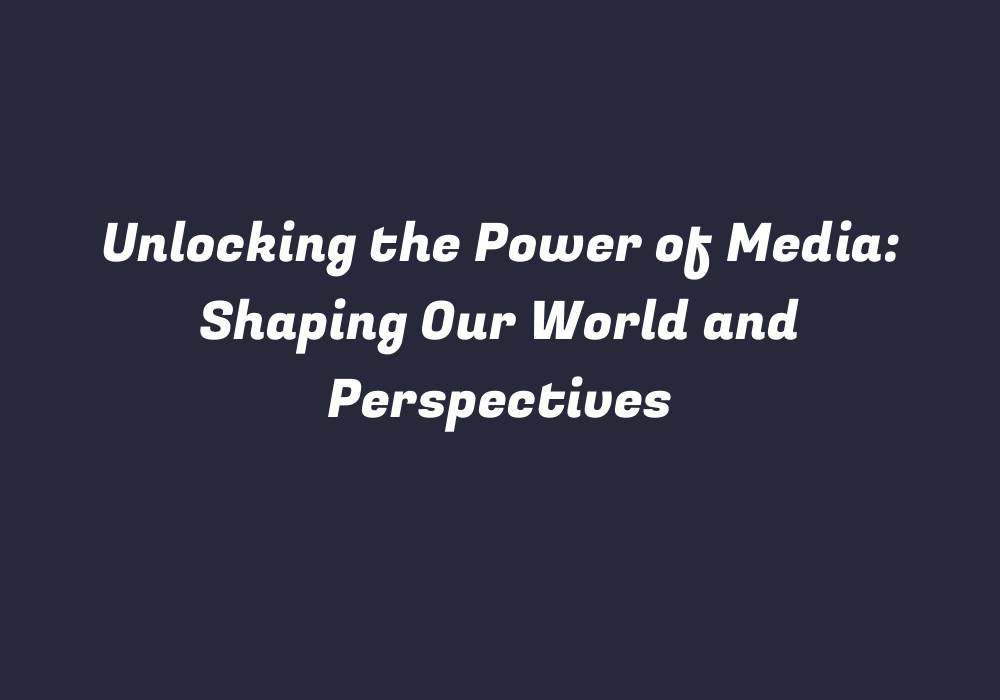Introduction
In today’s increasingly digital age, media has become an essential part of our lives, shaping how we perceive and experience the world. From television to social media platforms, it influences our thoughts, beliefs, and attitudes on various topics such as politics, science, culture, and art. This article aims to unravel the profound influence of media on shaping our world and perspectives, along with its potential for growth in the future.
Role of Media in Shaping World Views
Media has become a significant vehicle for disseminating information, opinions, and values. Through news reports, entertainment programs, and various media outlets, people across the globe receive content that shapes their perspectives on various topics. This influence can be both positive and negative depending on how we perceive and engage with it.
Access to Information and Education
One of the most significant contributions of media is providing easy access to information and education for a wide range of people. It has enabled individuals to expand their knowledge, learn new skills, and keep up with current events. Social media platforms have further enhanced this aspect by allowing users to connect with professionals, experts, and likeminded individuals from around the world. As a result, we can now learn from various perspectives, breaking down barriers of distance, language, and accessibility.
Promoting Cultural Diversity
Media is not only a medium for conveying information but also acts as a platform for showcasing diverse cultures. From traditional music to the latest fashion trends, we are exposed to various forms of art and expression that enrich our understanding and appreciation of different cultural backgrounds. This exposure contributes positively to breaking stereotypes and fostering inclusivity in society.
Influence on Public Opinion
Media’s impact on shaping world views extends beyond simply providing access to information. It plays a crucial role in shaping public opinion through its content, presentation, and the way it frames stories. By framing certain topics as central issues or setting specific narratives, media can shape how people perceive those subjects and form their opinions accordingly. This has significant implications for policymaking, social movements, and political discourse.
Challenges and Limitations of Media
Despite the many positive contributions of media in shaping our world views, there are challenges and limitations to consider. One of the most pressing concerns is the prevalence of misinformation and disinformation spread through various media outlets. This has led to the erosion of trust in traditional news sources and further fragmentation among different audiences.
Another issue is the potential for bias in reporting, with some media organizations leaning towards particular political views or interests while ignoring others. The rise of social media as a primary source for news can also result in an echo chamber effect, where users only encounter content that supports their existing beliefs and worldviews, further entrenching biases and limiting exposure to diverse perspectives.
Towards a More Informed Society
In order to make the most of media’s power in shaping our world views, it is crucial to foster an environment that promotes critical thinking and encourages engagement with various viewpoints. This can be achieved through education initiatives that teach media literacy skills from a young age, ensuring that individuals are better equipped to navigate and interpret information effectively.
Furthermore, promoting transparency and accountability within the media industry would contribute to restoring trust in news outlets and help combat the spread of misinformation. By fostering collaboration among journalists, educators, and civil society organizations, we can collectively work towards creating a more informed and inclusive society.
In conclusion, while the power of media has significant potential for shaping our world views and perspectives, there are both positive and negative aspects to consider. As we navigate the ever-evolving digital landscape, it is essential to be conscious of how we engage with different forms of media and work towards creating a more informed, inclusive, and equitable society.
